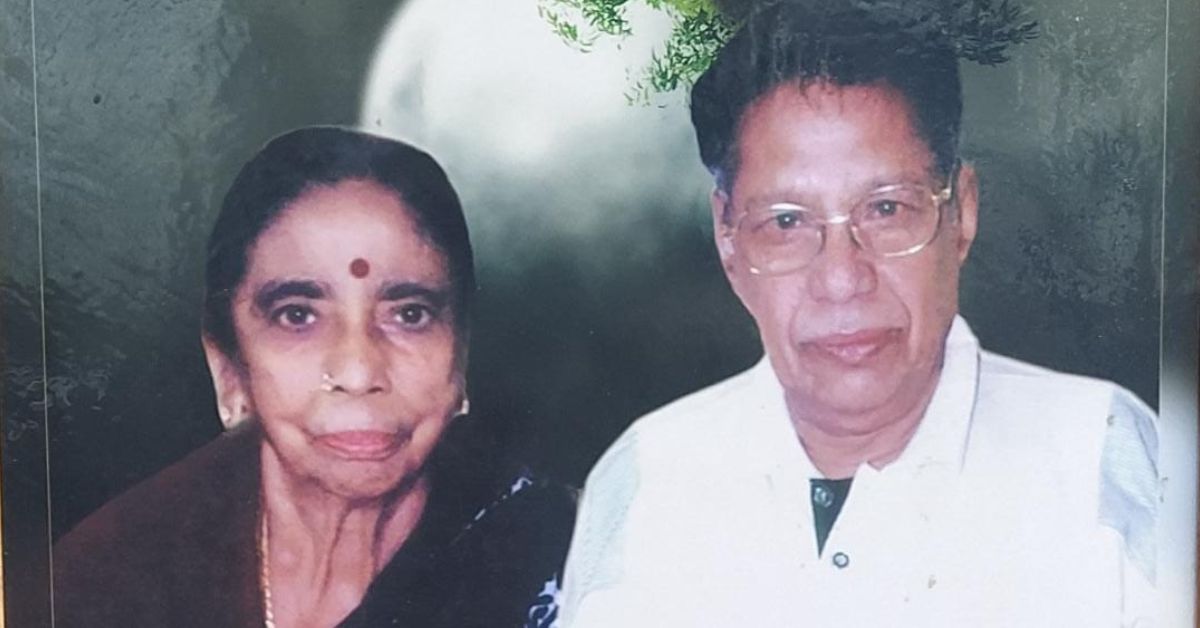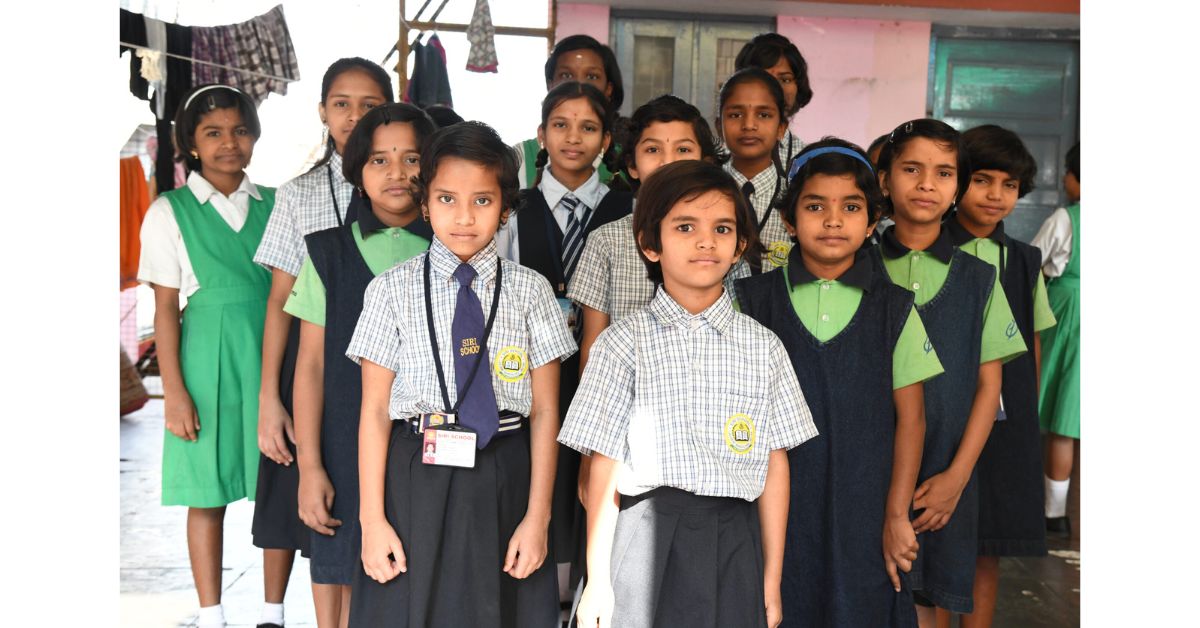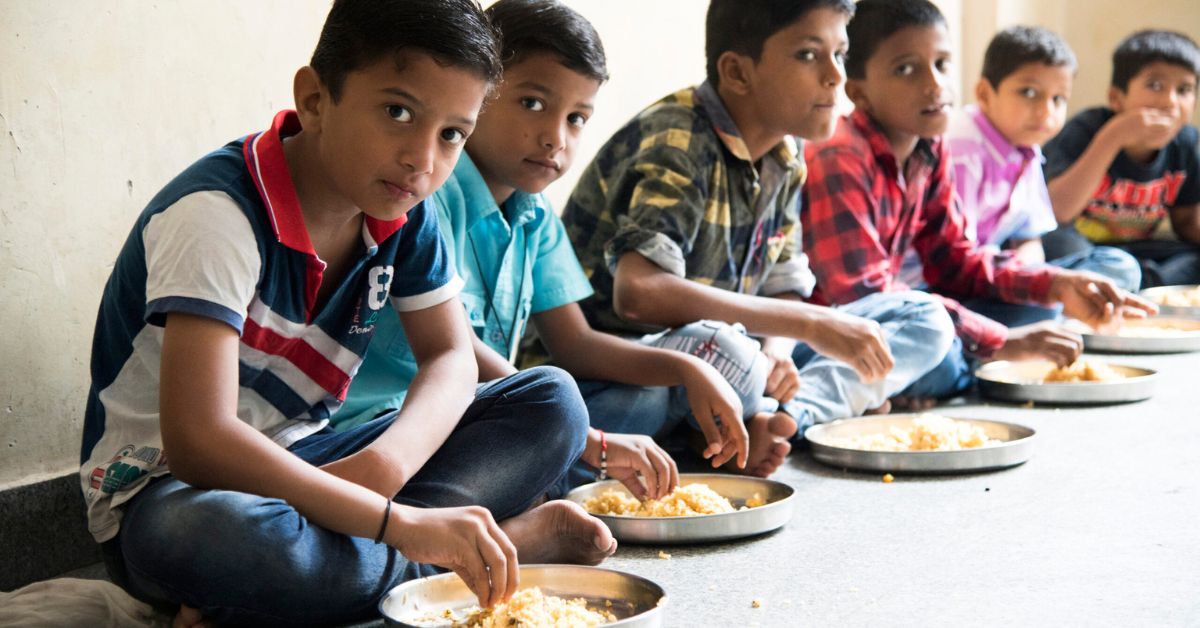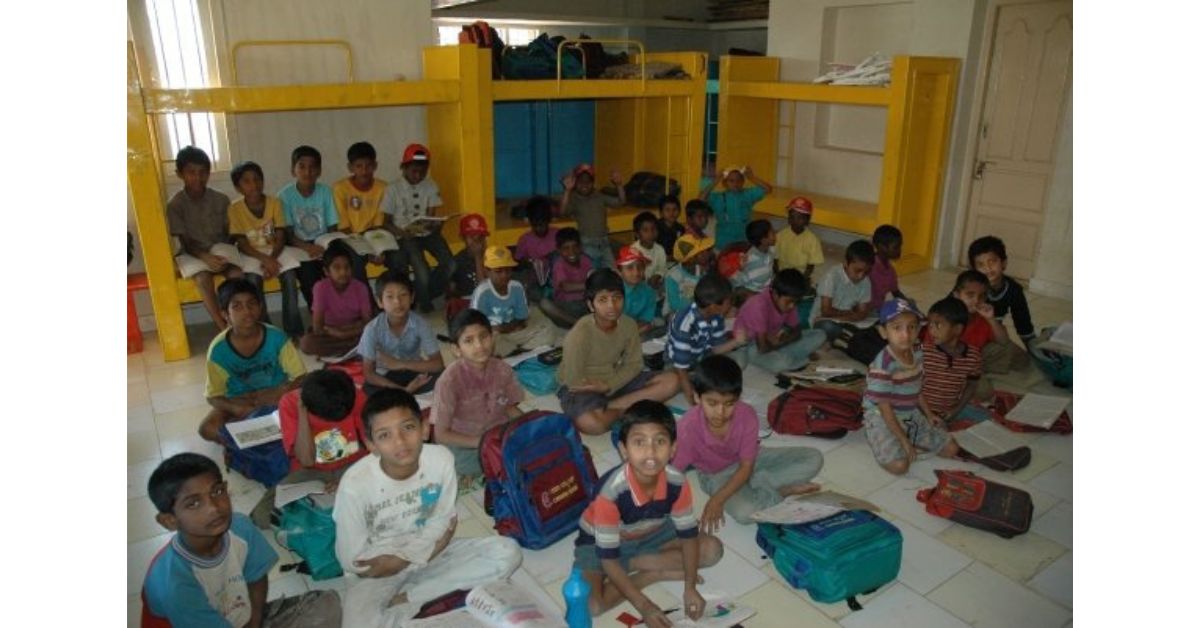In the early 1990s, while working at the Reserve Bank of India in Bengaluru, V Mani would pass through the Central Jail on his commute.
Here, he’d notice several children hanging around the premises. Curiosity made him enquire about them and he learnt that they were children of convicts, with nowhere to go.
“The children of life convicts are rendered orphans for all practical purposes, and to see them crying outside the jail is very sad,” he noted in an interview with rediff.
For women prisoners especially, losing links with their children once behind bars is a common reality. One report in The Wire explains that a child going missing, or the mother losing custody of the child while in prison, is so common that it is often accepted as “part of the punishment”. These children often end up as child labourers.
To give the innocent children a brighter future, Mani decided to do something.
After retirement, when his three children had settled abroad, Mani brough four children he had found outside the jail to his home. Using the Rs 7 lakh that he and his wife Saroji had saved over the years, they sheltered, fed, and educated the children.
This would sow the seeds of his NGO Society’s Care for the Indigent (SOCARE IND), formed in 1999. Today, the organisation works with children of long term prison inmates in different Karnataka jails, offering them a place to live, access to food and education, and ensuring a brighter future for them.
“They brought those kids up with a lot of struggle,” recalls Venkatanathan Raghavachari, SOCARE’s secretary since 2010 and a family friend of the couple. While his wife had died in 2008, V Mani passed away in 2011.

“[Mani] would collect old papers to sell them and earn money. On special occasions like his birthday, he would ask people for donations. He used to say, ‘If you can’t give more, give Re 1, even that’s enough’,” recalls Raghavachari. “Nobody can be as passionate as him. A man who sacrificed everything.”
Over the past 23 years, the NGO has worked hard to help these children stand on their own feet and wade through the stigma around them.
It has three buildings — two hostels in Laggere and a skill development centre in Gulbarga, which is still being developed. At their peak, they had over 150 children, but since COVID, many parents have refused to send their children back. Today, SOCARE works with 84 children.
‘Society looks at a convict’s whole family as criminals, even the children.’
“But now these children look at SOCARE as a source of strength,” notes Raghavachari.
In the early days, Mani’s initiative received immediate support from the jail superintendents. They also started giving him references of other homeless children who needed help. Mani would visit each child personally, investigate their situation, and then take them in.
Within a few years, the house was full, and he needed to look for more space. He found a building in Laggere that he wanted to convert into a hostel.
For this, he would need about 300 bags of cement, which he couldn’t procure because of a lack of funds. The officials at the Sri Sharada Peetham Sringeri Math helped Mani in arranging the cement, and the NGO is now a unit of the temple. For other funds, he sold his wife’s jewellery and set up donation drives, and soon, the building was up and running.
The Math officials also procured another building and named both to SOCARE. “We demolished the old building and constructed a state of the art building there,” says Raghavachari. The two hostels, one for girls and other for boys, have facilities like a library, computer lab, kitchen, prayer lab, and more.
The children in these hostels are sent to different nearby schools, depending on their flair for studies and ability to cope with the workload. Some go to English medium schools and others to Kannada medium.

They are also taken on regular prison visits to see their parents.
The younger children are brought to Bengaluru and enrolled in school, between kindergarten and Class 1. But older kids, the NGO noticed, are unable to cope with studies because of a weak education background.
For such cases, a skill centre was set up in Gulbarga, since most of the children’s parents were inmates at the Gulbarga Central Jail. “Last year, we completed the building, but it’s not operational yet,” says Raghavachari.
The NGO’s annual budget comes up to about Rs 70 lakh. In their endeavours, besides the Math who offer Rs 70,000 per month, SOCARE is supported by CSR wings of companies like Bosch and Citrix India, and a few regulars who donate money every year. They’ve also recently restored midday meals from ISKCON’s Akshaya Patra Foundation.
What happens to children of convicts?
Running such an initiative has come with a host of challenges. Working closely with these families has shown Raghavachari the irregularities of the justice system.
An Indian Express report claims that 76 per cent of India’s prisoners are undertrials. Moreover, says Raghavachari, he has personally come across several cases where innocent victims are wrongfully jailed. “The children are the victims of this social injustice. A lot of reform needs to happen,” he says.
When these prisoners are released, they’re struggling to rehabilitate into society. Most of them go on to work as labourers and daily wage earners who cannot take on the responsibility of a child. “They ask us to continue taking care of the child,” says Raghavachari.
The NGO’s goal was to keep the children sheltered till they graduated. But as they found more kids, they soon ran out of space and came to the decision that while they would continue supporting the child financially, they would send them back to their hometowns after Class 10.

Early one morning three years ago, Raghavachari got a call from Aksheeta (name changed), who’d just finished her Class 10 examination. A bright student, she’d been sent back home to continue studies but had returned to Bengaluru to collect her school certificate.
She told Raghavachari that she wanted to continue studying but that if she returned home, her father would get her married. Raghavachari called a lawyer who sent the Child Welfare Committee (CWC) to intervene. Since she was underage, they got an undertaking from her father saying he wouldn’t get her married.
The father, enraged, called Raghavachari and started abusing him. “He said she’s my daughter so who are you to take this decision,” recalls Raghavachari.
He says he calmed him down and spoke with the father, understanding that the man had just been released from prison and was working as a coolie. The expense of feeding and looking after his daughter was more than he could afford. “I understood his problem, it was a genuine issue,” says Raghavachari.
SOCARE then decided that while most children would be sent back home after Class 10, in special cases, they would retain the student. Aksheeta still lives at the SOCARE hostel, has completed her Class 12 with flying colours, and is now studying law.
While Aksheeta was rescued, Raghavachari rues that SOCARE has lost many girls to marriage. “Girls would go home for their vacation but then they would get married off, and they wouldn’t come back,” he says.
Another challenge today is ensuring SOCARE’s work continues. “We’re all old,” says Raghavachari about the committee. “We’re in the process of training and inducting new people. Hopefully the organisation will continue to grow,” he adds.

Through all the challenges, SOCARE continues focusing on its core mission of changing lives.
Sangeeta Nagraj, 30, joined SOCARE when she was 16. Her younger brother had been with them from LKG to Class 10, while she was at another orphanage before.
With SOCARE, she completed her Class 12 and got support as she pursued her CA. “When I was five years old, my father went to jail on a murder case. He was sentenced for 18 years,” she recalls.
“Before we went to SOCARE, people identified us by the name of our father and what he did. Once SOCARE gave us a good, private school education, we got good respect in society. Besides education, they also helped us grow up spiritually and culturally,” she says.
The hostel life has also been a fulfilling experience for her. “While normal kids grow up with a single brother or sister, we grew up with other kids and there was a unity and bond within us.”
Today, she works as an analyst at Accenture, is happily married, and blessed with a baby girl. “Without SOCARE, so many of us would not be in these positions where we’re living settled lives,” she adds.
You can help SOCARE and find more information by visiting their website.
Edited by Divya Sethu